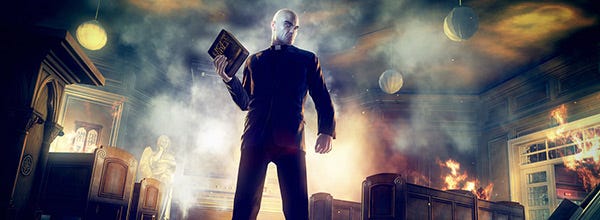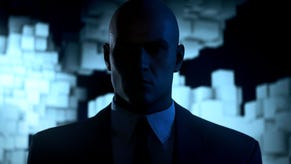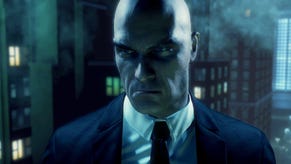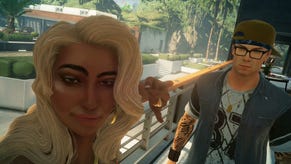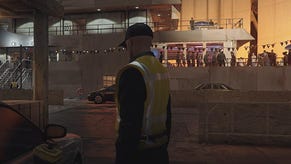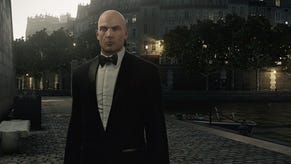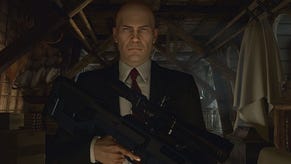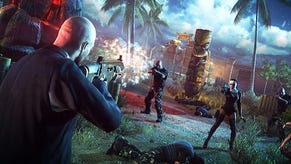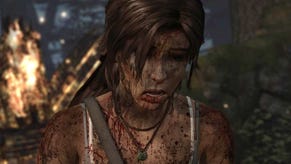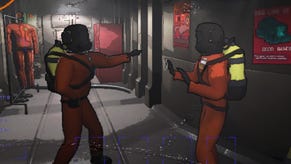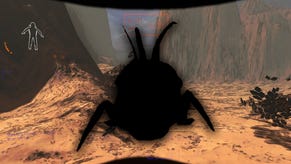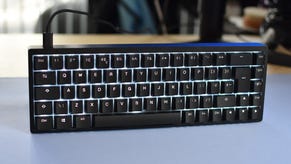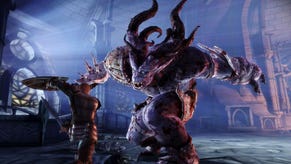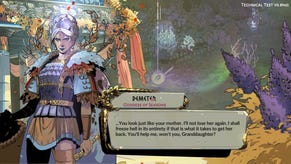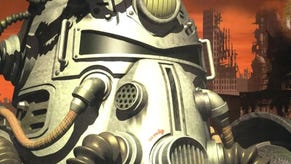Stealth Assured: Hitman Absolution Interview
The laughing man
Just after seeing Agent 47 do his rather John Woo-like thing, our man Dan Gril sat down with Tore Blystad, game director for Hitman: Absolution aka Hitman 5 aka Hitman: Subtitle, and asked the most pressing of questions: whether we've lost the silent assassin to open action aimed at impatient console gamers, or if stealth and caution are still very much the order of the day. And also where 47 gets his suits from.
RPS: Have you altered 47's appearance at all to match that of Timothy Olyphant?
Tore Blystad: Ha, no. Every time a different artist makes another rendition of him he kind of slightly changes.
RPS: Do you, like comic book artists, reinterpret him differently each time? E.g. Frank Miller's batman?
Tore Blystad: It's difficult with a character like this. There are so many things that you can't change, but if you pay attention... his tie is quite different from before. He's got this clip on his tie and the cut and fabric of his suit is different too.
RPS: So, who's his designer? Who made the outfit?
Tore Blystad: We will reveal that in the game, actually.
RPS: So, you go into a shop where there's just racks of red ties, black suits and white shirts?
Tore Blystad: Ha, you'll have to wait to find out. I'm not allowed to talk about it.
RPS: The alteration in physique makes him more limber and lean than previous games...
Tore Blystad: (laughing) yes, we usually call him the tank. We try to get away from the tank.
RPS: But for a tank, he can't take many hits.
Tore Blystad: (laughing) yes, a pretty rubbish tank.
RPS: More of a Volvo?
Tore Blystad: We really wanted the feeling of playing him not to be about failing mechanically, walking into a wall or failing to fibrewire someone, it's more about failing to hide his body or contain the situation. In the old games, it was taken for granted that whoever was playing was so good with the pad or mouse and keyboard that they would be able to perform all these things but, naturally, they weren't. So all these people were feeling like pretty rubbish hitmen, walking around all the time being shot at and failing to perform things that should be very natural to him.
RPS: Do you think that there's a tendency, not towards levelling down, but for all action games to go towards a centrepoint because of the imperatives of the mainstream audience?
Tore Blystad: I think, from a control point of view, everyone wants a unified system because it gives a better input; if you can pick up a game and instantly know how things are mapped out. The problem for us, we've been trying that a lot, but we still fail because we have so many extra mechanics that we're running out of buttons really quickly. In the old game, there were these stupid menus so you stood next to a guy that you could drag, take his clothes or his gun, there was a door, a fuse box and you had ten different options. How do we make this simple to understand? We're getting closer to that but without comprising, how to say, fidelity or choice, then making it more obvious for the player how to play the game.
RPS: For the PC, I guess you have as many buttons as you want. But that's like the old simulations where you needed a keyboard overlay.
Tore Blystad: (LAUGHS) Hey! Maybe we should do that! That's awesome.
RPS: There was something about the early Hitmans that was very simulation; we're going to make the best, most accurate game about killing people and trying to get away with it, and always realistically difficult. Are you going more for the entertainment side now?
Tore Blystad: That depends, there are a lot of the core mechanics to the game that have been revised but not fundamentally changed. The basic traits of the old game are the same in Absolution, but of course, there's always been a very strong desire to make a cinematic experience in Hitman games. Now we have much better tools than we ever had before, but its the balance of... when you make a game there's a lot of choice; how do you make a cinematic experience in that world without the player feeling that they're kind of being controlled, right? Of course, it's difficult to judge from a demo, but the way we've designed the games, the AI is the centrepiece of the tech, and the way that they react is beyond our control; for instance, the music system is listening to the AI, to determine what kind of music should be playing.
If you go in guns blazing, we know how many NPCs will go into combat mode or send out hunting parties for you, if you run away. The music will listen to all these things and give you a dramatic and suspenseful experience regardless of how you want to play the game. You can seamlessly go back and forth between all these different states. And this is how to show off without trying it out and seeing how my play style is reflected in how the game presents the world to me. This is the biggest challenge we've had, to feel linear but not be linear.
RPS: The end moment in the gung-ho playthrough, where you did the point shooting and killed a roomful of people, that was where you crammed all your cinematic tools in?
Tore Blystad: We can only do it there because that's where the player has decided how he wants to perform it. We can show it cinematically, but there is a way to skip what we're doing and say, either I want to do it by myself, set it up yourself, or say "screw this, I don't want to watch this crap, I just want to get on and do it".
RPS: Which would be impressive in itself, like the beginning of Swordfish.
Tore Blystad: Oh, god, yes, that's awesome. We're looking at stuff like that, how can we do this without compromising what the player wants to do. We tried all kinds of stuff for a very long time but so it's getting closer, its still being worked on the system, even if you did the worst point shooting ever, it should still look good. That's our goal!
RPS: And with the music, the way that syncs with the AI, if you killed anyone in the world apart from one of the nuns, will it change to angelic choirs? Or sexy Barry White music if they're getting it on?
Tore Blystad: (laughs) I think that might be going a little bit too far. Because not only is the music layered, but every single level has its own unique music, so that's a lot of content, many hours of music that needs to be produced. If there was a particular funny moment we would like to enhance it somehow, we have very diverse composers who can produce all these styles and sometimes they're sitting and jamming and they say "hey, can we use this stuff?" and we say "hey, that's awesome, let's make a new level for this", so its been very synergic effect between the music, which came early. That's new to us, before it was very much 'here's the game finished, now score this'. The art direction and audio direction have been the founding pillars of the project.
RPS: Trailers. How hard is it to do a stealth trailer without making it really boring?
Tore Blystad: (laughs) It's very hard. We have in-house group of people doing trailers and ideas, and it's getting out to the PRs; "more action, you have to have these big set pieces." But if you look back at the Hitman games, surprisingly much of the campaign material has been an AK or two guns shooting, it's actually not much derailing from what we've done in the past, but it's a very difficult thing to convey and we also had all these people coming with "stealth is dead, no-one cares, it's too slow and boring" and we're really... it's the most suspenseful play style, if you just take a little bit of time to invest tin it.
RPS: You're the Silent Hunter of action games.
Tore Blystad: (laughs) Maybe we can make more stealth-oriented trailers if you just tell these guys (points to PR).
RPS: Facetious question; what does he do in his downtime? Does he have any hobbies? Does he walk the dog?
Tore Blystad: (laughs) We've been thinking about that as well. It's hard to answer. We cannot write those things out properly; your guess is as good as ours. We cut down his dialogue a lot from the original script. He simply cannot say the words. He's so mechanical and logical. The whole disguise mechanic, the fact that he will just abandon his clothes and again, just to get through, he's a very disposable character, a non-character in many ways.
RPS: He's one of those tabula rasas, like Spock in Star Trek, a logical character, or any vaguely autistic movie character.
Tore Blystad: (laughs) Playing together with the choice that the player has, it makes him a very powerful character because then the player feels it’s their experience that he's conveying in the level.
RPS: He's the anonymous vector or avatar; he's also able to take a lot of shots now, though not a tank. In the first Hitman, you'd snipe someone and if you made it out, just running out, you'd be very, very lucky.
Tore Blystad: Like I say, we're taking some liberties with the code [today] just to make sure you guys don't see some guy dying three times in a row. It is interesting how marketing and PR changes what you can show and how you show it, compared to what the eventual game is like. There's a whole funnel. You can almost say that the code drops are kind of a trailer for the game as well.
RPS: So what you're saying to our readers is that the game will be NOTHING like what I've seen.
Tore Blystad: (laughs) NO! This code drop is highlighting the choice and tools available to the player. It's a very massive game. Naturally E3 was about bringing him back and showing him very superficially, the key strategies you can use in the game. This is more about what you can do to the game if you played it through in different styles. In the future, there are other topics that will also extend people's understanding of the game.
